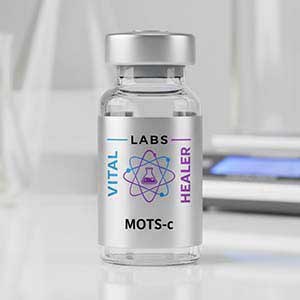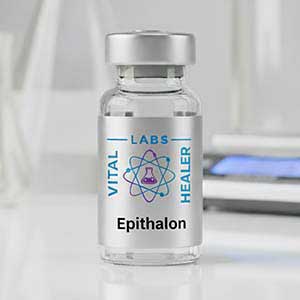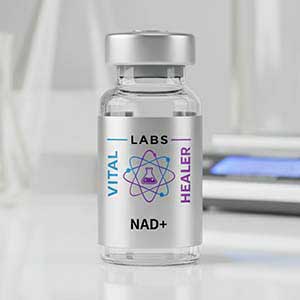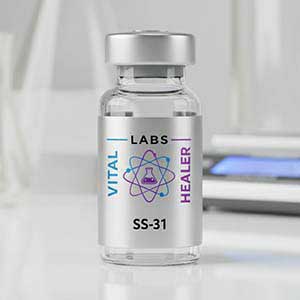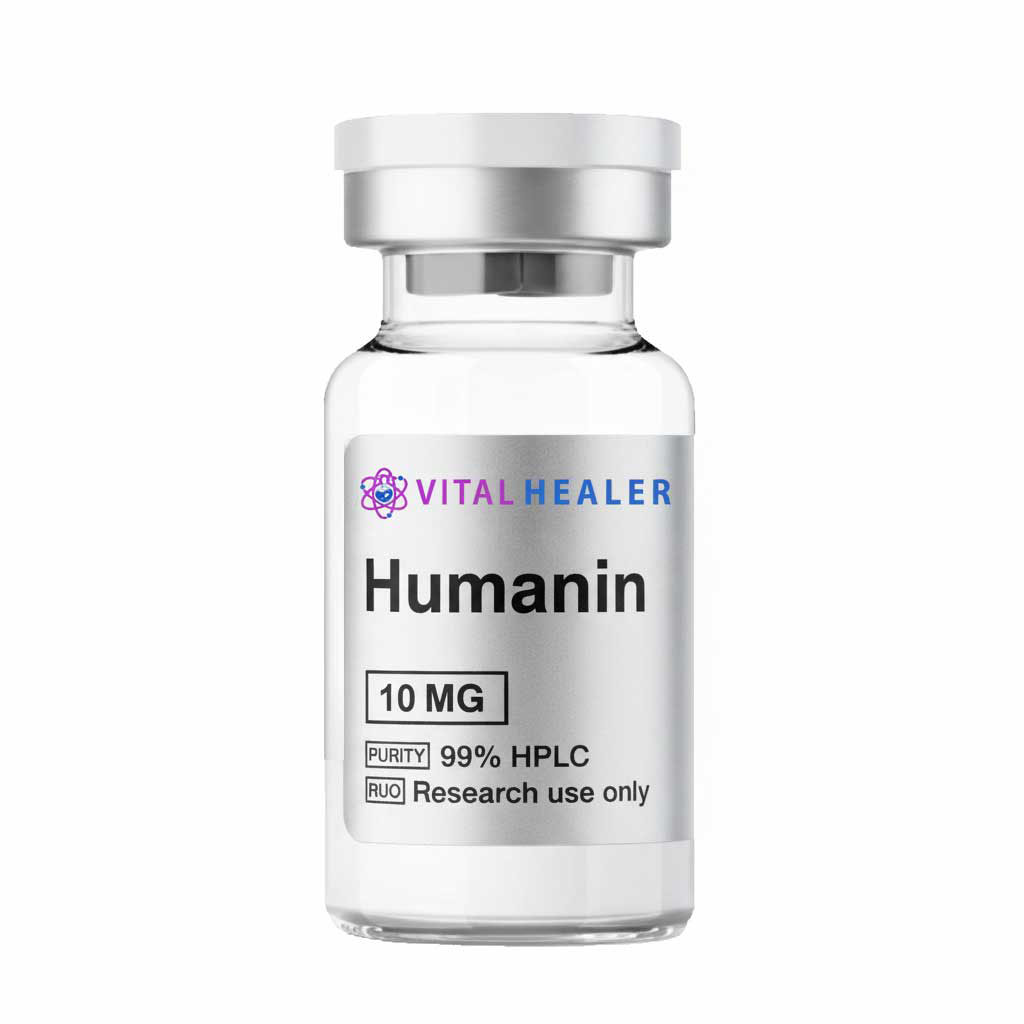
Humanin
A mitochondrial‑derived peptide first identified in neural tissues.
Key Research Properties:
| SKU: | humanin |
|---|---|
| Purity: | >99% (HPLC Verified) |
| Form: | Lyophilized Powder |
| Storage: | Store at -20°C |
| CAS Number: | 330936-69-1 |
| Lot Number: | HMN-2410-07: 10mg |
All products are sold strictly for laboratory and research purposes. Products are not intended for human use or consumption of any kind.
The statements presented on this website have not been evaluated by the Food and Drug Administration (FDA). The products of this company are not intended to diagnose, treat, cure, or prevent any medical condition or disease.
What is Humanin?
Humanin is a 24-amino acid mitochondrial-derived peptide (MDP) with potent cytoprotective, neuroprotective, and metabolic regulatory properties[1]. Discovered in 2001 in a screen for Alzheimer's disease-protective factors, Humanin has since been shown to protect against multiple age-related diseases, improve insulin sensitivity, and extend lifespan in animal models[2].
Biochemical Properties
- Sequence: MAPRGFSCLLLLTSEIDLPVKRRA
- Size: 24 amino acids (~2.7 kDa)
- Origin: Encoded in mitochondrial 16S rRNA gene
- Discovery: 2001 by Nishimoto et al. (Alzheimer's screen)
- Classification: Mitochondrial-derived peptide (MDP)
- Variants: HNG (highly potent analog with S14G mutation)
Primary Benefits
- Neuroprotection: Protects against Alzheimer's, stroke, neurotoxicity
- Metabolic Health: Improves insulin sensitivity; protects pancreatic β-cells
- Cardiovascular: Protects heart from ischemia; reduces atherosclerosis
- Anti-Apoptotic: Prevents programmed cell death in multiple tissues
- Longevity: Extends lifespan in animal models; declines with age
- Anti-Inflammatory: Reduces inflammatory signaling; modulates immune response
Molecular & Chemical Information
Peptide Sequence & Structure
| Property | Humanin |
|---|---|
| Peptide Sequence | MAPRGFSCLLLLTSEIDLPVKRRA |
| Molecular Weight | ~2,700 Da (2.7 kDa) |
| Length | 24 amino acids |
| CAS Number | 330936-69-1 |
| Origin | Mitochondrial 16S rRNA gene (MT-RNR2) |
| Receptor | CNTFR/gp130/WSX-1 tripartite complex |
| Discovery Year | 2001 |
Note: Humanin is a linear peptide encoded in the mitochondrial genome. The sequence represents the full-length 24-amino acid peptide with cytoprotective properties.
Key Research Findings
Breakthrough Discoveries
- Age-Related Decline: Humanin levels decrease with aging; low levels associated with age-related diseases[3]
- Alzheimer's Protection: Protects neurons from Aβ toxicity; reduces Alzheimer's pathology in models[2]
- Insulin Sensitizer: Improves glucose metabolism; protects against diabetes[10]
- Lifespan Extension: Transgenic mice overexpressing Humanin live longer, healthier lives[11]
- Cardiovascular Protection: Reduces myocardial infarction damage; protects against atherosclerosis[15]
- Receptor Identified: Binds to CNTFR/gp130/WSX-1 tripartite receptor complex[18]
Mechanism of Action
Humanin exerts cytoprotective effects through multiple mechanisms including anti-apoptotic signaling, metabolic regulation, and anti-inflammatory pathways[5].
Anti-Apoptotic Signaling
Cell Survival Pathways
Primary Mechanism: Humanin binds to the CNTFR/gp130/WSX-1 receptor complex, activating survival signaling cascades.
- Receptor Binding: Tripartite receptor (CNTFR, gp130, WSX-1/IL-27Rα)
- STAT3 Activation: Activates JAK-STAT3 pathway; promotes cell survival gene expression
- PI3K/Akt: Activates PI3K/Akt pathway; phosphorylates and inactivates pro-apoptotic BAD
- ERK1/2: Activates MAPK/ERK pathway; promotes cell survival and proliferation
- Bcl-2 Family: Modulates Bcl-2/Bax ratio; prevents mitochondrial outer membrane permeabilization
- Caspase Inhibition: Prevents caspase-3 and caspase-9 activation; blocks apoptosis execution
Neuroprotection
Alzheimer's & Neurodegeneration
- Aβ Protection: Protects neurons from amyloid-beta toxicity (Alzheimer's)[2]
- Oxidative Stress: Reduces ROS; enhances antioxidant defenses[13]
- Mitochondrial Function: Preserves mitochondrial membrane potential; prevents dysfunction[4]
- Inflammation: Reduces neuroinflammation; modulates microglial activation[12]
- Synaptic Protection: Preserves synaptic function; improves cognitive performance[2]
Metabolic & Cardiovascular Protection
Insulin Sensitivity & Heart Protection
- Insulin Sensitivity: Improves glucose uptake; enhances insulin signaling[10]
- β-Cell Protection: Protects pancreatic β-cells from apoptosis; preserves insulin secretion[10]
- Lipid Metabolism: Improves lipid profiles; reduces ectopic fat accumulation[10]
- Cardioprotection: Protects cardiomyocytes from ischemia-reperfusion injury[9]
- Atherosclerosis: Reduces plaque formation; stabilizes existing plaques[17]
- Endothelial Function: Improves vascular function; reduces endothelial dysfunction[14]
Research & Evidence
Humanin has been extensively studied for Alzheimer's disease, metabolic disorders, cardiovascular disease, and aging, with consistent cytoprotective effects across models[3].
Alzheimer's & Neurodegeneration
Neuroprotective Research
Key Findings: Humanin protects against Aβ toxicity and improves cognitive function in Alzheimer's models.
- Aβ Toxicity: Protects neurons from amyloid-beta-induced death in vitro and in vivo[2]
- Cognitive Function: Improves memory and learning in Alzheimer's disease models[2]
- Brain Pathology: Reduces amyloid plaques and neurofibrillary tangles[7]
- Clinical Correlation: Low Humanin levels in Alzheimer's patients; inverse correlation with disease severity[1]
- Stroke Protection: Reduces infarct size and neurological deficits in stroke models[6]
Metabolic & Cardiovascular Research
Diabetes & Heart Disease
- Insulin Resistance: Improves glucose tolerance and insulin sensitivity in diabetic models[10]
- Type 2 Diabetes: Low Humanin levels in diabetic patients; supplementation improves metabolic parameters[10]
- Myocardial Infarction: Reduces heart damage and improves recovery after heart attack[9]
- Atherosclerosis: Reduces plaque formation; stabilizes vulnerable plaques[17]
- Heart Failure: Protects against heart failure progression in animal models[15]
Aging & Longevity
Lifespan & Healthspan
- Age-Related Decline: Humanin levels decrease with age in humans and animals[3]
- Lifespan Extension: Transgenic mice overexpressing Humanin live significantly longer[11]
- Healthspan: Improved physical function, metabolic health in aged animals[11]
- Centenarian Studies: Higher Humanin levels in centenarians vs. age-matched controls[11]
- Age-Related Diseases: Protective against multiple age-related pathologies[8]
Dosing & Administration
Research Dosing (Extrapolated from Animal Studies)
Subcutaneous/Intramuscular Administration
Community/Anecdotal Doses: Based on animal study extrapolation
- Conservative Dose: 1-2 mg SC/IM, 2-3× weekly
- Standard Dose: 2-5 mg SC/IM, 2-3× weekly
- Higher Dose: 5-10 mg SC/IM, 2-3× weekly (some reports)
- HNG (Potent Analog): 0.5-2 mg SC/IM, 2-3× weekly (more potent than standard Humanin)
- Timing: No specific timing requirements; consistent schedule recommended
- Duration: Cycles of 4-12 weeks; breaks between cycles
Reconstitution & Storage
- Lyophilized Powder: Store at -20°C until reconstitution
- Reconstitution: Bacteriostatic water for injection
- Reconstituted Storage: Refrigerate at 2-8°C; use within 7 days
- Handling: Gently swirl; avoid vigorous shaking
Safety & Side Effects
Humanin has demonstrated excellent safety in animal studies with no significant adverse effects at therapeutic doses[11].
Preclinical Safety Profile
Animal Studies: Humanin shows excellent tolerability across multiple species.
- No Toxicity: No significant adverse effects in preclinical studies
- Long-Term Safety: Chronic administration well-tolerated in animals
- Organ Function: No adverse effects on liver, kidney, heart function
- Natural Peptide: Endogenously produced; supplementation mimics physiological levels
- Overexpression: Transgenic mice with lifelong Humanin overexpression show no adverse effects
Frequently Asked Questions
Clinical Trials & Development Status
Humanin has extensive preclinical research and emerging human observational data. Several clinical trials are currently investigating Humanin's role in acute kidney injury and cardiovascular complications.
Registered Clinical Trials
NCT06105229: Clinical Value of Plasma Humanin in Acute Kidney Injury
Official Title: Clinical Value of Plasma Humanin in Acute Kidney Injury
Status: Unknown status
Condition: Acute Kidney Injury
Location: Guangdong, Guangzhou, China
ClinicalTrials.gov Identifier: NCT06105229
NCT06125249: Humanin's Value for Early Diagnosis and Short-term Prognosis in Patients With AKI After Heart Transplantation
Official Title: Humanin's Value for Early Diagnosis and Short-term Prognosis in Patients With AKI After Heart Transplantation
Status: Recruiting
Conditions:
- Acute Kidney Injury
- Heart Transplant Surgery
Location: Guangdong, Guangzhou, China
ClinicalTrials.gov Identifier: NCT06125249
NCT03431844: Humanin Isoforms in Cardiac Muscle and Blood Plasma and Major Complications After Cardiac Operation
Official Title: Humanin Isoforms in Cardiac Muscle and Blood Plasma and Major Complications After Cardiac Operation
Status: Completed
Conditions:
- Coronary Artery Bypass Surgery
- Myocardial Ischemia
Locations:
- Tallinn, Harju, Estonia
- Tartu, Tartu, Estonia
ClinicalTrials.gov Identifier: NCT03431844
Preclinical Research
Animal Model Studies
Extensive Preclinical Foundation: Humanin has been studied in multiple disease models with consistent cytoprotective effects.
- Alzheimer's Models: Protects against Aβ toxicity; improves cognition in APP/PS1 mice
- Diabetes Models: Improves glucose tolerance and insulin sensitivity in db/db, high-fat diet models
- Cardiovascular Models: Reduces infarct size in MI models; protects against atherosclerosis
- Aging/Longevity: Transgenic overexpression extends lifespan and healthspan
- Safety: No adverse effects in chronic dosing studies
Human Observational Studies
Clinical Correlations
Human Studies: Observational research links Humanin levels to disease and longevity.
- Alzheimer's Disease: Lower Humanin levels in AD patients vs. controls; inverse correlation with disease severity
- Type 2 Diabetes: Reduced Humanin in diabetic patients; correlation with insulin resistance
- Cardiovascular Disease: Lower levels in patients with atherosclerosis, heart failure
- Aging: Humanin declines with age in general population
- Longevity: Higher Humanin levels in centenarians vs. age-matched controls
Implication: These correlations support Humanin's role in disease protection and suggest therapeutic potential.
References & Scientific Citations
Research Integrity:
All references are from peer-reviewed journals documenting Humanin discovery and research. All claims made on this page are backed by published scientific literature.
Citations
- Matsuoka M, Hashimoto Y. Humanin and the receptors for humanin. Mol Neurobiol. 2010;41(1):22-28. [Springer]
- Nishimoto I, Matsuoka M, Niikura T. Unravelling the role of Humanin. Trends Mol Med. 2004;10(3):102-105. [Cell Press]
- Coradduzza D, Congiargiu A, Chen Z, Cruciani S. Humanin and its pathophysiological roles in aging: A systematic review. Biology (Basel). 2023;12(4):558. [MDPI]
- Lee C, Yen K, Cohen P. Humanin: a harbinger of mitochondrial-derived peptides? Trends Endocrinol Metab. 2013;24(5):222-228. [Cell Press]
- Guo B, Zhai D, Cabezas E, Welsh K, Nouraini S, et al. Humanin peptide suppresses apoptosis by interfering with Bax activation. Nature. 2003;423(6938):456-461. [Nature]
- Xu X, Chua CC, Gao J, Hamdy RC, Chua BHL. Humanin is a novel neuroprotective agent against stroke. Stroke. 2006;37(10):2613-2619. [AHA Journals]
- Niikura T, Chiba T, Aiso S, Matsuoka M. Humanin: after the discovery. Mol Neurobiol. 2004;30(3):327-340. [Springer]
- Gong Z, Tas E, Muzumdar R. Humanin and age-related diseases: a new link? Front Endocrinol (Lausanne). 2014;5:210. [Frontiers]
- Charununtakorn ST. Potential roles of humanin on apoptosis in the heart. Cardiovasc Hematol Disord Drug Targets. 2016;16(1):45-52. [Wiley Online Library]
- Muzumdar RH, Huffman DM, Atzmon G, Buettner C, et al. Humanin: a novel central regulator of peripheral insulin action. PLoS One. 2009;4(7):e6334. [PLOS ONE]
- Yen K, Mehta HH, Kim SJ, Lue YH, Hoang J. The mitochondrial derived peptide humanin is a regulator of lifespan and healthspan. Aging (Albany NY). 2020;12(12):11185-11199. [PMC]
- Karachaliou CE, Livaniou E. Neuroprotective action of humanin and humanin analogues: research findings and perspectives. Biology (Basel). 2023;12(12):1534. [MDPI]
- Yen K, Lee C, Mehta H. The emerging role of the mitochondrial-derived peptide humanin in stress resistance. J Mol Endocrinol. 2013;50(1):R11-R19. [PMC]
- Widmer RJ, Flammer AJ, Herrmann J, et al. Circulating humanin levels are associated with preserved coronary endothelial function. Am J Physiol Heart Circ Physiol. 2013;304(3):H393-H398. [American Journal of Physiology]
- Rochette L, Meloux A, Zeller M, Cottin Y. Role of humanin, a mitochondrial-derived peptide, in cardiovascular disorders. Arch Cardiovasc Dis. 2020;113(8-9):564-571. [ScienceDirect]
- Bodzioch M, Lapicka-Bodzioch K, Zapala B, Kamysz W. Evidence for potential functionality of nuclearly-encoded humanin isoforms. Genomics. 2009;93(3):247-256. [ScienceDirect]
- Bachar AR, Scheffer L, Schroeder AS, et al. Humanin is expressed in human vascular walls and has a cytoprotective effect against oxidized LDL-induced oxidative stress. Cardiovasc Res. 2010;88(2):360-366. [Oxford Academic]
- Ying G, Iribarren P, Zhou Y. Humanin, a newly identified neuroprotective factor, uses the G protein-coupled formylpeptide receptor-like-1 as a functional receptor. J Immunol. 2004;172(11):7078-7085. [ResearchGate]
- Thamarai Kannan H, Issac PK, Dey N, Guru A. A review on mitochondrial derived peptide humanin and small humanin-like peptides and their therapeutic strategies. Int J Pept Res Ther. 2023;29(4):58. [Springer]
- Lei H, Rao M. The role of humanin in the regulation of reproduction. Biochim Biophys Acta Gen Subj. 2022;1866(1):130018. [ScienceDirect]
Additional Resources
For researchers interested in further reading:
Third-Party Testing Results
All products undergo rigorous third-party HPLC (High-Performance Liquid Chromatography) testing to verify purity and quality.

About HPLC Testing:
High-Performance Liquid Chromatography (HPLC) is a standard analytical technique used to verify peptide purity. Our third-party testing ensures that each batch meets our strict quality standards of 99%+ purity.
Related Research Peptides
